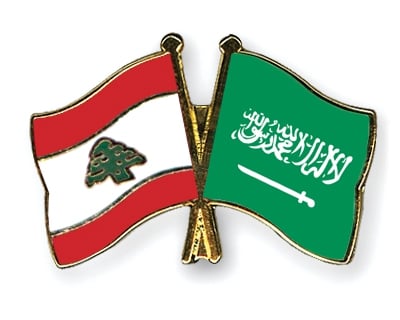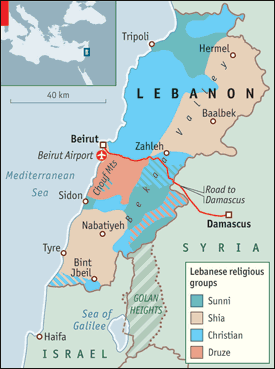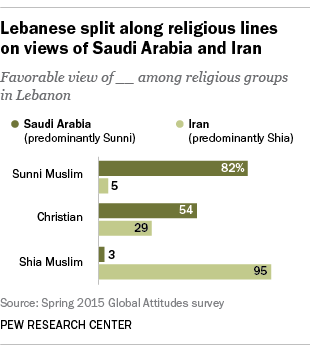
Saudi Arabia’s decision to suspend $4 billion in military aid to Lebanon is the latest example of a meddlesome foreign power attempting to undermine Lebanese sovereignty to advance its own political agenda. And while Lebanon has endured numerous power plays in the past, the Saudis’ latest gambit could escalate the geopolitical tug-of-war between Saudi Arabia and Iran, further destabilizing Lebanon’s delicate political and sectarian equilibrium.
Lebanon is home to an amalgam of ethnic and religious groups. Its diversity has created a unique social mosaic, rich in culture and history. Unfortunately, this diverse sectarian makeup has made Lebanon vulnerable to prolonged periods of instability. The Lebanese political system is based on a power-sharing agreement between its three largest religious sects—Maronite Christians, Sunni and Shia Muslims.
This power-sharing agreement, laid out in the Ta’if Accord, following the end of the 15-year Lebanese Civil War and later amended with the Doha Agreement in 2008, has kept the peace between Lebanon’s major religious groups. But this tenuous period of calm remains highly susceptible to fluctuations in regional political and sectarian tension.

The conflagration raging in Syria, Iraq and Yemen has upped the stakes for regional hegemony between the Middle East’s major powers. The ideological rhetoric espoused by Saudi Arabia and Iran is fomenting divisions across the Arab world—divisions that are magnified exponentially within Lebanese society. Stability in Lebanon is maintained with the understanding that no group will attempt to seize more power than it has been allotted—maintaining the status quo keeps Lebanon from descending into another civil war. This understanding, however, has fallen prey to irresponsible non-state actors seeking to develop a conduit to project military and political power.
Iran, the most prolific foreign operator inside Lebanon, has transformed the small Mediterranean nation into its own personal satellite state. Over the last ten years, Hezbollah, bolstered by the political, financial, and military support of Iran’s Revolutionary Guard Corps, has become the dominant force in Lebanon and the Islamic Republic’s go-to proxy in the region. Through the implementation of systematic manipulation, violence and intimidation, Hezbollah has successfully exploited deeply rooted sectarian divisions within Lebanese society and nurtured an anemic political system incapable and unwilling to confront its assertive push for greater power and influence.
Hezbollah’s position in Lebanon has afforded the Shiite group carte blanche to pursue its own regional agenda—a privilege that it has chosen to exercise with increasing vigor and to the benefit of its masters in Tehran. Hezbollah’s willingness to utilize its formidable paramilitary apparatus and leverage over the central government has become a parasitic presence in Lebanon—undermining its sovereignty and compromising its national security.
The Saudis, as well as the other Gulf States, have made it a political and military imperative to counter the shadow of Iranian influence spreading across the region—wherever and whenever possible. Saudi Arabia covets Iran’s position of privilege in Lebanon and resents the success they have achieved co-opting the Lebanese government. The Saudis, by drawing this line in the sand, are attempting to isolate Hezbollah and demonstrate the costs associated with allowing the powerful Shiite group to take over the Lebanese government. The message to the Kingdom’s political allies in the pro-Western March 14 coalition is clear—the days of taking Saudi patronage for granted are over.
The unwavering support Lebanon enjoyed during the reign of King Abdullah and his predecessors is now being brought into question by the House of Saud’s new sovereign. The ascension of King Salman to the throne signals a profound shift in the Kingdom’s policy toward Lebanon. A report published by al-Monitor in June 2015 cites a number of anonymous sources that revealed King Salman, at the time, was contemplating utilizing Beirut’s dependence on Saudi Arabia patronage to demonstrate its leverage over Lebanon’s fragile political and economic system. Unfortunately, King Salman’s short-sighted strategy only demonstrates Saudi Arabia’s inherent weakness inside Lebanon’s complicated political arena.
Saudi Arabia has been working behind the scenes for decades, diligently worming its way into a position of influence in Lebanon. And while Iran, through its Hezbollah proxies, has been successful in hijacking the Lebanese government and establishing a praetorian guard that rivals the Lebanese Armed Forces, the Saudis have managed to ingratiate themselves within Lebanon’s economic infrastructure and creating a political class wholly dependent on Saudi patronage. Saudi Arabia’s decision to freeze billions in military aid demonstrates Riyadh’s willingness to force political compliance utilizing the only leverage at its disposal—money.

Lebanon’s economy has one of the highest debt-to-GDP ratios in the world—$70 billion or 145% of GDP. And the Saudis act as guarantor of a large portion of Lebanese debt. Saudi Arabia and the other Gulf States currently host half a million Lebanese expatriates, many of whom work in prominent positions throughout the Kingdom, generating $5 billion in annual remittances. Shortly after announcing the freeze in aid, 90 Lebanese nationals were fired from their jobs in Saudi Arabia. While it is unlikely these Lebanese expats will be expelled in mass, it is yet another area the Saudis can exploit should their current ploy fail to illicit the desired response. But even a modest deportation of Lebanese nationals could have profound financial and political repercussions.
Saudi Arabia warned its citizens against traveling to Lebanon and urged those currently residing there to return home—a move that the other Gulf States soon emulated. The departure of wealthy Gulf state tourists will damage Lebanon’s tourist industry, which accounts for 7.5% of GDP. The Kingdom and other Gulf states also encouraged its citizens to withdraw any deposits residing in Lebanon’s central bank—a move which could see $900 million dissipate from its total foreign reserves of over $37 billion.
The Saudis’ decision to withdraw financial support for Lebanon also coincides with the passage of the “Hezbollah International Financing Prevention Act of 2015,” a new piece of U.S. legislation aimed at curtailing Hezbollah’s financial networks—a move which many in Lebanon fear could further damage the Lebanese economy. On Wednesday, the Saudi-led Gulf States moved collectively to officially label Hezbollah a terrorist organization, piling on international pressure against the Shiite militia group, but also making it more difficult for political rivals to begin a dialogue. Traditionally, negotiations with terrorist groups do not go very well and are rarely bare fruit.
Before the war in 1975, Lebanon was the fulcrum of the Middle East’s economic system, linking the oil-rich Gulf States with Western financial markets. Lebanon’s preeminent economic status collapsed in the 1980s as the country descended into civil war. It was during this tumultuous period that the Saudis stepped in, bringing the countries warring factions together, and helping facilitate an end to the conflict. The agreement that laid the foundation for Lebanon’s political system, the Ta’if Accord, takes its name from the Saudi city where the peace summit was held. It is ironic given the historic role Saudi Arabia played in helping to pull Lebanon out of the abyss, that the Kingdom would choose to try and illicit change in Lebanon by pushing it so close to the precipice.
If the Saudis choose to pull all the financial “self-destruct” levers at their disposal, it will undoubtedly damage Lebanon’s already fragile economy. But the absence of Saudi financial support could also provide Iran with an opportunity to step in, and, just like in the aftermath of the Israel-Hezbollah War in 2006, provide vital economic and social assistance to those in need—a move that gave Hezbollah a massive boost in popularity throughout Lebanon, and led to a significant political windfall during the negotiation of the Doha Accord in 2008.
The Kingdom has trumpeted up a story that it is withdrawing support to Lebanon because of some diplomatic slight. This is pure fiction. In reality, the Saudis decision to take punitive action against Lebanon is a poorly planned ruse designed to cover up its inability to outmaneuver Iran’s takeover. The Saudis, quite simply, have been outplayed. This desperate and dangerous gambit will most likely backfire—further marginalizing Saudi Arabia, and helping tighten Hezbollah’s grip over the country.
Perhaps more severe than the economic blowback that could result from Saudi Arabia’s decision to withdrawal financial support to Lebanon is the potential political damage that could be done to the country’s already dysfunctional government. On Wednesday, Lebanon’s parliament, for the 36th time in almost 2 years, failed to elect a president. The prolonged political deadlock between Hezbollah’s March 8th alliance and the March 14th coalition, aligned with Saudi Arabia and Western powers, has resulted in a vacuum of power at the top of the Lebanese government.
Without a president to lead the government, Lebanon has fallen into a period of political atrophy compromising the government’s ability to function effectively. Perpetuating Lebanon’s political anemia allows Hezbollah greater freedom to pursue its own political and military agenda. A fragmented government plays into Iran’s hands and puts Saudi-backed opposition at a greater disadvantage, as the parliament is the only battleground that the March 14th coalition can hope to win against Hezbollah.
But Saudi Arabia’s abrupt withdrawal in support for the March 14th coalition will make negotiating a political solution to the crisis even more difficult. Saad Hariri, the beleaguered leader of the March 14th coalition, only recently returned to Lebanon from exile, after his national unity government collapsed under political pressure from Hezbollah, in 2011. Mr. Hariri’s return marked the 11th anniversary of the death of his father, Prime Minister Rafik Hariri whose assassination is widely believed to have been orchestrated by Hezbollah. The assassination of Mr. Hariri, Sr. is a stark reminder of the precarious position the March 14th coalition finds itself.
Politics and religion are intertwined in Lebanon. If the Saudis’ actions force Mr. Hariri to confront Hezbollah politically, the ensuing battle in parliament could potentially precipitate an outbreak of violence. The Saudis are looking to disrupt the balance of power in Lebanon, but they’ve chosen to do so by further empowering Hezbollah. If the political crisis deepens and Lebanon’s financial infrastructure fails, it would create a perfect storm that would make a violent confrontation between Lebanon’s warring factions—both political and sectarian—inevitable. In an attempt to leverage greater influence over its allies, Saudi Arabia may have inadvertently set Lebanon down a very dangerous road.
The highly unstable geopolitical battle between Saudi Arabia and Iran being played out across the region guarantees Lebanon will be dragged further into the fray. The country commemorated the 40th anniversary of its 15-year civil war with two simple words—“Never Again.” This sentiment echoes true in the hearts and minds of many Lebanese, especially those old enough to have witnessed the horrors of that conflict firsthand. However, much time has passed since that devastating war, and the fear of returning to those dark days has not immunized the country to the growing sectarian and political threat germinating inside its borders.
The Lebanese government has neither the will nor the capability to rein in the destructive foreign influences wreaking havoc on Lebanese society. Whether it’s Iran’s quest to solidify its hegemonic ambition in the Levant, or Saudi Arabia’s flagrant and unapologetic financial and political manipulation, the Lebanese people will invariably lose out in the end.